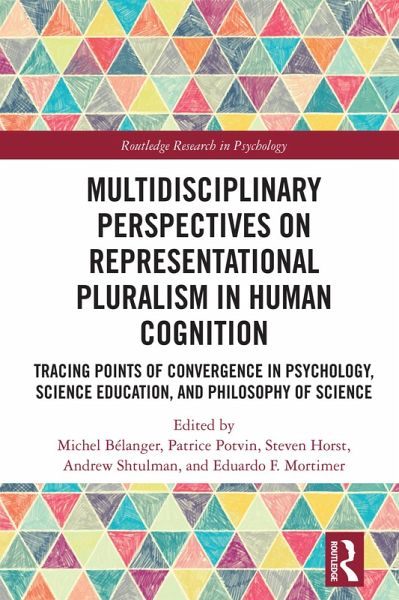
Multidisciplinary Perspectives on Representational Pluralism in Human Cognition (eBook, PDF)
Tracing Points of Convergence in Psychology, Science Education, and Philosophy of Science
Redaktion: Bélanger, Michel; Mortimer, Eduardo F.; Shtulman, Andrew; Horst, Steven; Potvin, Patrice
Versandkostenfrei!
Sofort per Download lieferbar
41,95 €
inkl. MwSt.
Weitere Ausgaben:

PAYBACK Punkte
21 °P sammeln!
Bringing together diverse theoretical and empirical contributions from the fields of social and cognitive psychology, philosophy and science education, this volume explores representational pluralism as a phenomenon characteristic of human cognition.Building on these disciplines' shared interest in understanding human thought, perception and conceptual change, the volume illustrates how representational plurality can be conducive to research and practice in varied fields. Particular care is taken to emphasize points of convergence and the value of sharing discourses, models, justifications and...
Bringing together diverse theoretical and empirical contributions from the fields of social and cognitive psychology, philosophy and science education, this volume explores representational pluralism as a phenomenon characteristic of human cognition.
Building on these disciplines' shared interest in understanding human thought, perception and conceptual change, the volume illustrates how representational plurality can be conducive to research and practice in varied fields. Particular care is taken to emphasize points of convergence and the value of sharing discourses, models, justifications and theories of pluralism across disciplines. The editors give ample space for philosophers, cognitive scientists and educators to explicate the history and current status of representational pluralism in their own disciplines.
Using multiple forms of research from the relational perspective, this volume will be of interest to students, scholars and researchers with an interest in cognitive psychology, as well as educational psychology and philosophy of science.
Building on these disciplines' shared interest in understanding human thought, perception and conceptual change, the volume illustrates how representational plurality can be conducive to research and practice in varied fields. Particular care is taken to emphasize points of convergence and the value of sharing discourses, models, justifications and theories of pluralism across disciplines. The editors give ample space for philosophers, cognitive scientists and educators to explicate the history and current status of representational pluralism in their own disciplines.
Using multiple forms of research from the relational perspective, this volume will be of interest to students, scholars and researchers with an interest in cognitive psychology, as well as educational psychology and philosophy of science.
Dieser Download kann aus rechtlichen Gründen nur mit Rechnungsadresse in A, B, BG, CY, CZ, D, DK, EW, E, FIN, F, GR, HR, H, IRL, I, LT, L, LR, M, NL, PL, P, R, S, SLO, SK ausgeliefert werden.













